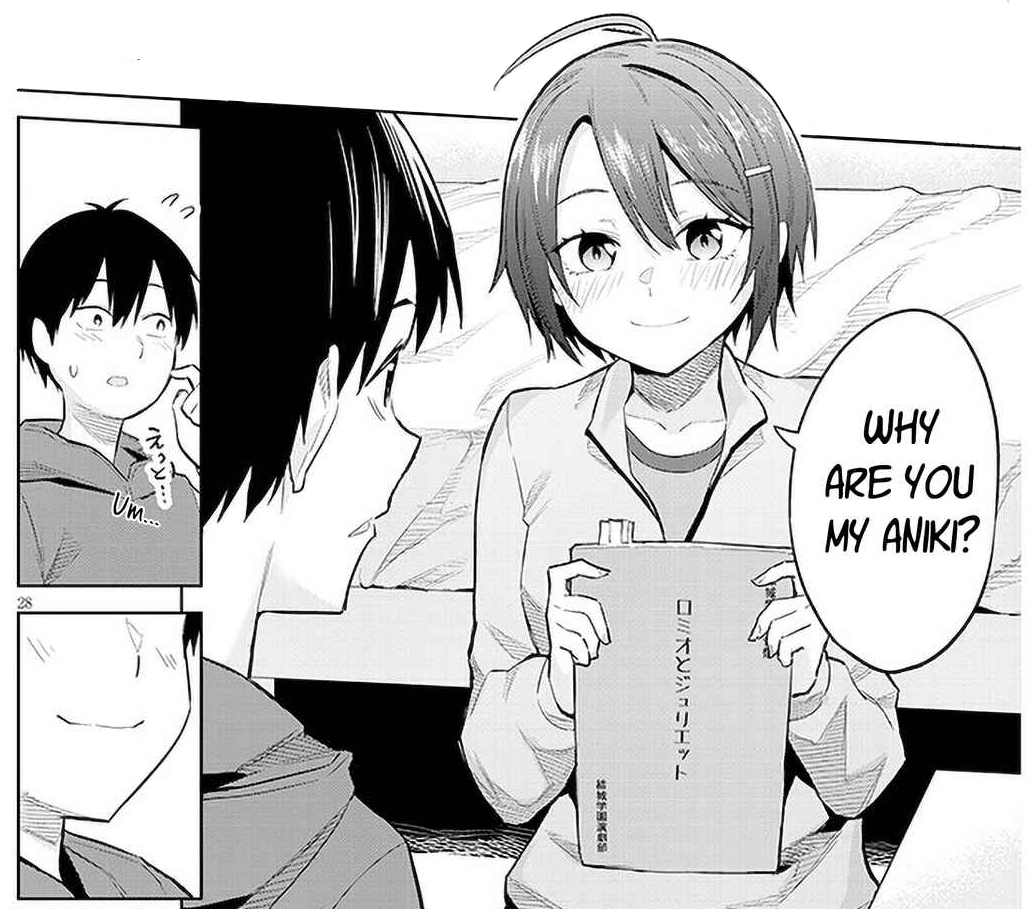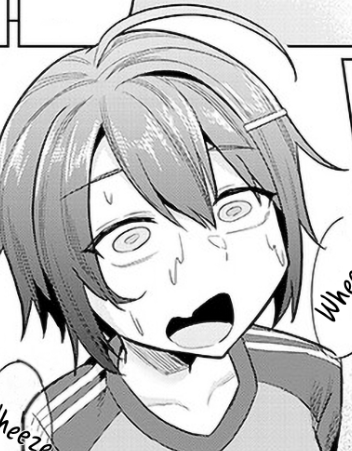You are using an out of date browser. It may not display this or other websites correctly.
You should upgrade or use an alternative browser.
You should upgrade or use an alternative browser.
Saikin Dekita Giri no Otouto no Kyorikan ga Yatara Chikai wake - Vol. 3 Ch. 13
- Thread starter MangaDex
- Start date
Dex-chan lover
- Joined
- Feb 7, 2018
- Messages
- 432
“But… they have one condition” that sounds like the start to a……
Dex-chan lover
- Joined
- Mar 15, 2019
- Messages
- 759
Aniki's monkey brain (probably)


Group Leader
- Joined
- Mar 1, 2023
- Messages
- 85
Haven't seen the original RAW, but I suspect it might be more accurate to say "Wherefore art thou Aniki?" or at least "Why are you Aniki" instead of "why are you my Aniki", since it's pretty clear she's referencing the play and the very slight correlation of being in love with someone whose very name makes their love "forbidden".
Dex-chan lover
- Joined
- Jan 22, 2018
- Messages
- 4,944
Why are the parents still relevant in my rom com smh
Banned
- Joined
- Apr 26, 2020
- Messages
- 296
Demolish little sister's vaginas
Dex-chan lover
- Joined
- Feb 5, 2023
- Messages
- 2,420
Thanks for the translation.
As for the original raw, in Japanese, she says 「どうして兄貴は兄貴なの?」, which-- without any context inference-- can be read as "Why is [aniki], [aniki]?" On one hand, this is following the essence of that line in the play (i.e. "Romeo, why are you Romeo?", or essentially, "why did you have to be born as someone I can't be with?").
That said, a reference is a reference. Her Japanese is modern and standard, so it's most appropriate to translate that in Modern English rather than Early Modern English. Also in the raws, Hinata reciting the script segment is done in modern standard Japanese, so it's possible that their play's dialogues are altogether in modern standard Japanese and not in any earlier form that would be best recontextualized for an English audience as Early Modern English.
I think it's fine that it's brought up in a chapter discussion, but it might have been good to bring up the possibility of this in a translator's note.
I find this idea worthy of consideration. In fact, you're probably right.Haven't seen the original RAW, but I suspect it might be more accurate to say "Wherefore art thou Aniki?" or at least "Why are you Aniki" instead of "why are you my Aniki", since it's pretty clear she's referencing the play and the very slight correlation of being in love with someone whose very name makes their love "forbidden".
As for the original raw, in Japanese, she says 「どうして兄貴は兄貴なの?」, which-- without any context inference-- can be read as "Why is [aniki], [aniki]?" On one hand, this is following the essence of that line in the play (i.e. "Romeo, why are you Romeo?", or essentially, "why did you have to be born as someone I can't be with?").
That said, a reference is a reference. Her Japanese is modern and standard, so it's most appropriate to translate that in Modern English rather than Early Modern English. Also in the raws, Hinata reciting the script segment is done in modern standard Japanese, so it's possible that their play's dialogues are altogether in modern standard Japanese and not in any earlier form that would be best recontextualized for an English audience as Early Modern English.
I think it's fine that it's brought up in a chapter discussion, but it might have been good to bring up the possibility of this in a translator's note.
Last edited:
Dex-chan lover
- Joined
- Jul 20, 2023
- Messages
- 3,185
Damn, didn't realize that Romeo and Juliet have the same bad ending as your usual incest manga
Dex-chan lover
- Joined
- Jan 18, 2018
- Messages
- 661
If you're interested, Juliet says 「おゝ、ロミオ、ロミオ! 何故(なぜ)卿(おまへ)はロミオぢゃ!」 in some translation I found (Wikisource). Quite a bit more dramatic (obviously) but same meaning.As for the original raw, in Japanese, she says 「どうして兄貴は兄貴なの?」, which-- without any context inference-- can be read as "Why is [aniki], [aniki]?"
Group Leader
- Joined
- Feb 7, 2023
- Messages
- 45
Fixed! And yes, you are correct to assume that the script segment overall is in modern standard Japanese as mentioned by Hinata in page 11 - "Itou-san has arranged the lines to make them easier to say".Thanks for the translation.
I find this idea worthy of consideration. In fact, you're probably right.
As for the original raw, in Japanese, she says 「どうして兄貴は兄貴なの?」, which-- without any context inference-- can be read as "Why is [aniki], [aniki]?" On one hand, this is following the essence of that line in the play (i.e. "Romeo, why are you Romeo?", or essentially, "why did you have to be born as someone I can't be with?").
That said, a reference is a reference. Her Japanese is modern and standard, so it's most appropriate to translate that in Modern English rather than Early Modern English. Also in the raws, Hinata reciting the script segment is done in modern standard Japanese, so it's possible that their play's dialogues are altogether in modern standard Japanese and not in any earlier form that would be best recontextualized for an English audience as Early Modern English.
I think it's fine that it's brought up in a chapter discussion, but it might have been good to bring up the possibility of this in a translator's note.
Dex-chan lover
- Joined
- Jun 7, 2020
- Messages
- 418
think of the poor typesetter oobakaHaven't seen the original RAW, but I suspect it might be more accurate to say "Wherefore art thou Aniki?" or at least "Why are you Aniki" instead of "why are you my Aniki", since it's pretty clear she's referencing the play and the very slight correlation of being in love with someone whose very name makes their love "forbidden".
Dex-chan lover
- Joined
- Mar 15, 2019
- Messages
- 759
IMO the line should have been "Wherefore art thou, Aniki?" simply because that's how us native English speakers know it and we would then be more likely to get the reference to the play. English speaking fans are the intended audience for these translations, after all.Fixed! And yes, you are correct to assume that the script segment overall is in modern standard Japanese as mentioned by Hinata in page 11 - "Itou-san has arranged the lines to make them easier to say".
"Wherefore" is a very archaic word meaning "Why" or "For what reason". But many native English readers actually don't know that. Many think Juliet is asking "Where are you, Romeo?" but she is really asking "Why are you, Romeo?" This may be why the English to Japanese translations of Shakespeare's play might have translated the intended meaning. There might be no archaic Japanese equivalent to "wherefore" and had to use the Japanese word for "why".
So, "Why are you, Aniki" went right over most of the English readers heads.
Similar threads
- 0
- Replies
- 1
- Views
- 1
- Replies
- 2
- Views
- 1
- Replies
- 2
- Views
- 36
- Replies
- 37
- Views
Users who are viewing this thread
Total: 2 (members: 0, guests: 2)


